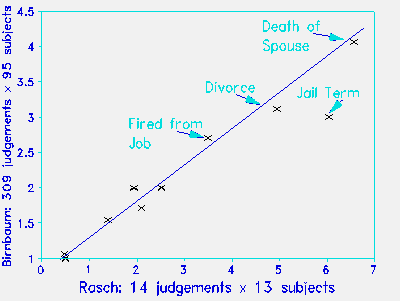
A paradox of statistics is that more elaborate, highly parameterized models often neither describe the data better nor provide as robust a basis for inference as simpler measurement models. A case in point is M. H. Birnbaum's (1991) finding that three types of judgements must be combined to successfully scale the items on the Schedule of Recent Events (Holmes & Rahe, 1967). In his study, 95 subjects contrasted 15 stressful events, by being asked to judge:
(1) the relative stress of pairs of events as ratios, e.g., 1/8, 1/4, ½, 1, 2, 4, 8;
(2) the relative stress of pairs of events as differences, using a 200-point rating scale where 0 = No difference between the pair, 100 = event 1 very much more stressful than event 2, and -100 = event 2 is very much more stressful than event 1;
(3) the stress produced by all possible combinations of one, two, and three events, where 0 = No stress at all and 100 = maximal stress.
These resulted in 309 judgements per subject, which were then consolidated to produce a "unified" scale of stressful events.
Is such a complex data-intensive procedure necessary to produce a useful scale for these stressful events? The Rasch model for dichotomous paired-comparisons:

is not only much more simple, but encompasses both ratio and difference scaling. Like every Rasch model, it requires the data to fit the model according to probabilistic specifications. As a result, problems caused by data imprecision and sample dependence are exposed and addressed.
Using new judgements of the 15 stressful events, in which 13 persons each made only 14 paired-comparison judgements, a Rasch-calibrated scale was constructed. The Figure plots it against Birnbaum's scale. The two methods produce the same scale of stressful events, but each Rasch subject made 95% fewer judgements. The Rasch data also distinguish between "Divorce" and "Jail Term" and so are more plausible than Birnbaum's data which scales them the same.

William of Occam asserted that "What can be accounted for by fewer assumptions is explained in vain by more." When choosing between equally fruitful approaches, the simpler one is to be preferred. Complex item response models are often mistaken to be more effective than simpler, more profound models. This illustration refutes that misguided notion.
Karabatsos G. (1998) Occam's Razor At Work. Rasch Measurement Transactions 11:4 p. 587-8.
Birnbaum M.H., Sotoodeh Y. (1991) Measurement of stress: Scaling the magnitudes of life changes. Psychological Science 2(4) 236-243.
Holmes T.H., Rahe R.H. (1967) The social readjustment scale. Journal of Psychosomatic Research 11 213-218.
Occam's Razor At Work. Karabatsos G. … Rasch Measurement Transactions, 1998, 11:4 p. 587-8.
| Forum | Rasch Measurement Forum to discuss any Rasch-related topic |
Go to Top of Page
Go to index of all Rasch Measurement Transactions
AERA members: Join the Rasch Measurement SIG and receive the printed version of RMT
Some back issues of RMT are available as bound volumes
Subscribe to Journal of Applied Measurement
Go to Institute for Objective Measurement Home Page. The Rasch Measurement SIG (AERA) thanks the Institute for Objective Measurement for inviting the publication of Rasch Measurement Transactions on the Institute's website, www.rasch.org.
| Coming Rasch-related Events | |
|---|---|
| Jan. 16 - Feb. 13, 2025, Fri.-Fri. | On-line workshop: Rasch Measurement - Core Topics (E. Smith, Winsteps), www.statistics.com |
| Apr. 8 - Apr. 11, 2026, Wed.-Sat. | National Council for Measurement in Education - Los Angeles, CA, ncme.org/events/2026-annual-meeting |
| Apr. 8 - Apr. 12, 2026, Wed.-Sun. | American Educational Research Association - Los Angeles, CA, www.aera.net/AERA2026 |
| May. 15 - June 12, 2026, Fri.-Fri. | On-line workshop: Rasch Measurement - Core Topics (E. Smith, Winsteps), www.statistics.com |
| June 19 - July 25, 2026, Fri.-Sat. | On-line workshop: Rasch Measurement - Further Topics (E. Smith, Winsteps), www.statistics.com |
The URL of this page is www.rasch.org/rmt/rmt114b.htm
Website: www.rasch.org/rmt/contents.htm